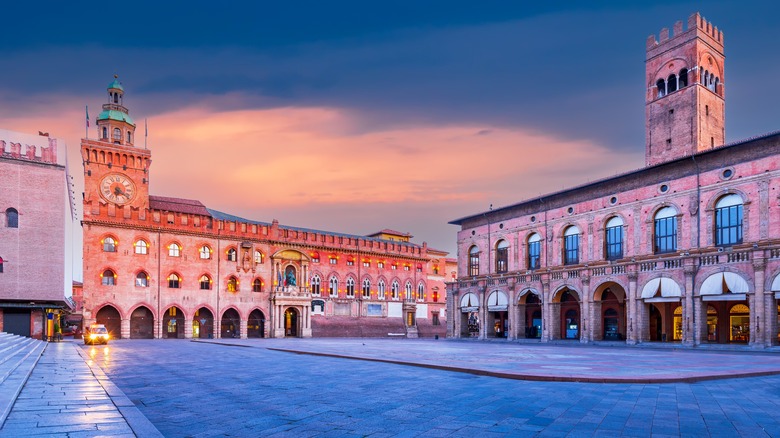A global sensation that’s captivated carb-lovers with its steamy tomato sauce poured over a bed of beef and pasta, spaghetti alla Bolognese might just be the world’s most famous pasta plate — that is, everywhere except Italy. While this world-renowned dish is on the menu of nearly every neighborhood Italian trattoria, attempting to order spaghetti alla Bolognese as your secondi in Italy would be a tragic mistake. Italians scoff at the popular misconception that their European nation is the founder of such an inauthentic Italian dish. While native Italians inspired this foreign pasta plate, it was Italian immigrants to the U.S. who crafted the recipe.
Spaghetti Bolognese may be nonexistent in Italian culture, but there is a distant cousin born in the province of Bologna that closely resembles the rest of the world’s favorite dinnertime staple. According to the New Zealand Herald, tagliatelle al ragù is the Italian equivalent of the iconic spaghetti alla Bolognese — an overflowing bowl of handmade egg pasta tossed with meat, tomatoes, and a montage of delicacies native to the region that gives this dish its signature texture and flavor.
The term ragù originates from the French term ragoûter, meaning “to revive the taste” — a well-fitting moniker for this soul-warming sauce that’s a cozy blend of simple yet bold ingredients. Bologna offers a ton of delicious cuisine, so it’s no surprise that it is responsible for concocting not only the nation’s iconic ragù sauce, but also mortadella, Parmigiano Reggiano, balsamic vinegar, and tortellini, as well.
Spaghetti Bolognese vs tagliatelle al ragù
![]()
What’s the difference between these two seemingly identical dishes? The answer lies in the sauce. Whenever you come across a pasta dish with the word “ragù” attached to its moniker, you can assume it’s referring to the preparation of the sauce. A traditional ragù sauce contains a simple tomato and meat base that’s combined with thicker types of pasta, like tagliatelle, gnocchi, or tortellini. The Bologna Chamber of Commerce and Italian Academy of Cuisine verified the official recipe for ragù classico bolognese in 1982. The recipe contains a minimal ingredient list, consisting of nothing more than minced beef, unsmoked pancetta, onions, tomatoes, carrots, celery, meat stock, wine, whole milk, salt, and pepper. This official recipe came hundreds of years after the first modern-day ragù sauce was invented in the late 1700s in Imola, Italy, gaining popularity throughout the Emilia-Romagna region and the province of Bologna in the 1800s.
America received its first introduction to Italy’s original ragù sauce (which didn’t contain spaghetti) in the 1900s along with a fresh wave of Italian immigrants. Hungry for a taste of their homeland in a new community, they reached for the most accessible products in the United States, resulting in a refreshed version of Italian ragù — spaghetti alla Bolognese, containing spaghetti paired with a simple meat sauce. The newly-discovered spaghetti alla Bolognese dish erupted into a global excitement, spreading from the small, wedged-together kitchens in the heart of New York City and reaching as far as Australia and the United Kingdom.
Best restaurants in Bologna to try tagliatelle al ragú
![]()
With countless restaurants in the city of Bologna, five of which are Michelin-star approved, it’s impossible to squeeze them all in during a single trip. With limited time abroad, choosing your lunch and dinner spots carefully is essential to ensure you’re getting the most mouthwatering food in Italy. According to Taste Atlas, the foodie encyclopedia of the world, there’s a handful of trattorias sprawled across Bologna that should be on your radar.
Osteria dell’Orsa sits at the top of their list. The homestyle kitchen and cozy, laid-back ambiance will make you feel like you’re dining in your own living room rather than a public trattoria. Located in the University District, less than $10 is all you should expect to pay to feast on some of Bologna’s best tagliatelle al ragù.
All’Osteria Bottega is another fantastic spot for the dish. This small ristorante keeps things formal and classy in its tiny dining space, with enough seating for just 20 guests. Its name perfectly reflects the culinary works of craftsmanship shaped inside this kitchen, as a bottega is a term often used to describe a small artisan workshop. Their homemade ragù is made with no oils, keeping the miniature pieces of beef and shaved Parmigiano Reggiano the center of attention.

